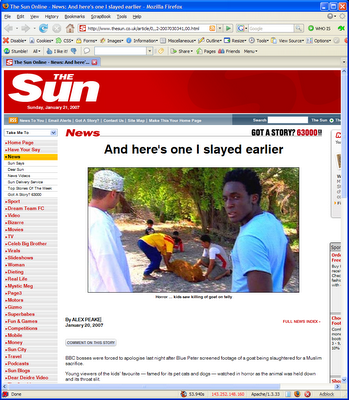Blue Peter has apologised for showing children the ritual slaughter of a goat in scenes that included the animal’s agonised death throes.
Ofcom criticised the BBC after viewers complained that the scenes, shown without warning, were shocking and wholly unsuitable for children.
The footage was shown in a feature about a village in Oman preparing for the Eid ul-Fitr festival. The killing was shown in long-shot and from behind, so that the method of slaughter was not visible, but the BBC admitted that the death throes were apparent. Ofcom said the goat was clearly seen “twitching” in close-up as it expired and considered that the final moments of its death were “not appropriate on this occasion”.
The BBC said Blue Peter had recognised immediately that the subject should not have been shown in such detail and apologised to viewers and children the day after broadcast.
Hmmm. The BBC’s claim that “Blue Peter had recognised immediately that the subject should not have been shown in such detail” is utter tosh. When we first covered this appaling story back on January 23rd, I noted that:
…having searched through BBC Views Online’s search engine, the Blue Peter Homepage and the BBC’s Press Office, I can find no references to this apology from the editor of Blue Peter – has it passed you by Beeboids? There’s still time to get an article up on BBC Views Online’s Entertainment page, the place where you normally need no excuse to toot the BBC’s horn!
Even now, searching Google for site:bbc.co.uk “blue peter” oman goat slaughter returns just one result, a BBC Complaints response allegedly published on 19 Jan 2007, in which Richard Marson, Editor of Blue Peter, states:
We thought long and hard about the treatment of this story. We decided to include it because it is a fact of life not only in Oman but all over the world and we felt that it was important to show the link between the food that people eat and where it actually comes from.
So, on the one hand, we have the editor of Blue Peter saying “we thought long and hard about the treatment of this story” and on the other we have “Blue Peter… recognised immediately that the subject should not have been shown in such detail”. Well, which is it?
And even if they did recognise their error immediately afterwards, shouldn’t it have been just as obvious immediately before it was broadcast? We are talking about alleged broadcasting professionals here, aren’t we? Has anyone been punished or reprimanded over this now admitted error?
P.S. Beeboids: There’s still time to get an article up on BBC Views Online’s Entertainment page about this BBC story – you know you would if another broadcaster had done this…


